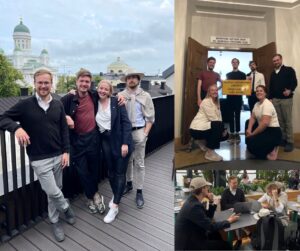Study visit to Finland
On August 21st and 22nd, the board, policy advisor Mikael, and council member Karl Lembit visited the Finnish university student union, Suomen ylioppilaskuntien liitto (SYL). The goal was to learn about their advocacy work and explore potential collaborations.
 We began the meeting by acquainting ourselves with the Finnish higher education system and current relevant topics. Naturally, we couldn’t avoid discussing the political situation in Finland, where the right-leaning government aims to cut a significant portion of state expenses, which also affects higher education and students.
We began the meeting by acquainting ourselves with the Finnish higher education system and current relevant topics. Naturally, we couldn’t avoid discussing the political situation in Finland, where the right-leaning government aims to cut a significant portion of state expenses, which also affects higher education and students.
Subsequently, we delved into SYL’s own structure and history. SYL is over a century old and represents all Finnish universities, as the Finnish higher education law stipulates that all students must be members of their university’s student union by paying a membership fee. This is also crucial for their advocacy work, as many politicians are SYL alumni, and nearly everyone is familiar with what SYL stands for.
Their document of public policy positions is extensive and comprehensive. As a result, a 7-member board derives specific thematic stances from it, which are utilized in their actual advocacy work.
In addition, we met with the student union of the largest university in Finland, the University of Helsinki. They also collaborate with SYL, but their focus is primarily on Helsinki, hence their close cooperation with the Helsinki city government. Moreover, student representatives are involved in all decision-making bodies within the university.
We also discussed political lobbying and SYL’s approach to parliamentary elections. A particularly interesting strategy in this year’s elections was the act of calling politicians. SYL, together with its member organizations, aimed to contact all candidates in the parliamentary elections to pose a few simple and direct questions. For instance, they inquired whether university education should be tuition-based. Subsequently, their campaign gained media coverage and attention, thereby amplifying their campaign through the responses they received. They also found that focusing on one issue in their platform, instead of several, worked effectively.
We also discussed how SYL formulates its social policies. An important keyword for them was healthcare, as SYL facilitates health insurance for students in Finland. Additionally, a significant concern in Finland is student housing and state support for living expenses. Furthermore, SYL is heavily engaged in promoting gender equality.
As a final topic, we talked about the Finnish initiative known as “Students at Risk.” SYL, along with the union of Finnish universities of applied sciences (SAMOK), secured funding for this year to initiate a project that allows endangered students in their home countries to study in Finland with waived tuition and special support.
Katariina, the chairperson of EÜL, was satisfied with the visit, noting that compared to Denmark, the Finns approach their political work quite differently. Therefore, it was beneficial to see an alternative approach. She also found it highly valuable to establish contact with the coordinator of the Students at Risk program in Finland, as this program addresses a need in Estonia as well.
Lennart, the vice-chairperson of EÜL, also deemed the meeting necessary. He highlighted the meeting with the student union of the University of Helsinki, where they learned how students can contribute to the city’s development and political decision-making processes, beyond educational policies.
Mikael, the policy advisor of EÜL, was most surprised by how much more the Finnish organization engages in compared to what the number of students suggests. “An especially memorable example is the fact that SYL is involved in development cooperation in developing countries. As part of their brand, SYL spreads values of gender equality, tuition-free education, and accessibility to higher education in Africa,” he stated.
Karl Lembit, a member of EÜL’s council, took away the idea that successful advocacy requires participation from all member organizations. “While Finnish politicization might be more suitable for Finland’s context than Estonia’s, the sense of representation is something we could more easily adopt,” he commented.
The project was supported by the Nordic Council of Ministers.
